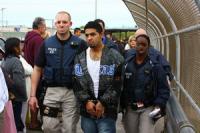-
In El Paso Court, Migrants No Longer Get Legal Advocates or Pre-hearing Briefings on Their Rights
El Paso’s backlogged immigration court recently halted programs designed to aid asylum seekers as they navigate a complicated legal system. “The confusion in the courtroom is palpable,” says one advocate.
-
-
To Stem the Flow of Refugees, Address the Conflicts at Its Core
The growing number of Central American refugees reaching the U.S. southern border adds to the unfathomable record of 70.8 million people counted globally as of December who had fled their homes as a result of war, persecution, and other conflict, according to a new report from the United Nations.
-
-
To Stem the Flow of Refugees, Address the Conflicts at Its Core
The growing number of Central American refugees reaching the U.S. southern border adds to the unfathomable recordof 70.8 million people counted globally as of December who had fled their homes as a result of war, persecution, and other conflict, according to a new report from the United Nations. The figure represented an increase of 2.3 million from a year earlier. More than 41 million sought sanctuary within their own countries. And almost 26 million had crossed borders and were officially classified as refugees, half of them children. The remaining 3.5 million of the total were awaiting decisions on applications for asylum to find refuge abroad. Viola Gienger writes in Just Security that the report by the U.N. refugee agency on 19 June drew wide attentionfrom news media. But, as has been the case for years, most of the talk of possible solutions — including for the current migration crisis at the southern border of the United States – focuses on how to handle the never-ending flow of people: how to resettle them, how to secure their rights, whether to build a wall or send them back. “What oddly gets short shrift is the most durable solution of all: resolving the violent conflicts and persecution that are driving people from their homes in the first place,” Gienger writes.
-
-
DHS Chief Orders Probe of Agents' Offensive Facebook Posts

DHS secretary on Wednesday ordered an immediate investigation into a report that current and former U.S. Border Patrol agents are part of a Facebook group that posts racist, sexist and violent comments about migrants and Latin American lawmakers.
-
-
Mexicans in U.S. Routinely Confront Legal Abuse, Racial Profiling, ICE Targeting and Other Civil Rights Violations

Officially, the Constitution of the United States gives everyone on U.S. soil equal protection under the law – regardless of nationality or legal status. But, as recent stories of the neglectful treatment of migrant children in government detention centers demonstrate, these civil rights are not always granted to immigrants.
-
-
People want to donate diapers and toys to children at Border Patrol facilities in Texas. They’re being turned away.

The substandard living conditions in Border Patrol facilities holding migrant children have been described in great detail over the past few weeks. Last week, an attorney for the U.S. Department of Justice argued in court that the government shouldn’t be required to give migrant children inside Border Patrol detention facilities toothbrushes, soap, towels, wipes, diapers, blankets, or showers. A Border Patrol official told a Texas state lawmaker that the agency doesn’t accept donations for facilities where children are reportedly being held in substandard conditions.
-
-
Does Europe need migrants?
A European Commission-IIASA flagship report has found that an increase in the EU population aged 65+ is certain – regardless of higher fertility or migration. However, raising labor force participation (particularly for women) and improved education of natives and migrants have the power to nullify aging-related worries.
-
-
Private prisons have a political role in corrections issues in the U.S.
Private prisons hold more than 120,000 inmates, about 8 percent of all prisoners, for 29 states and the federal government. The two largest private prison companies also operate more than 13,000 beds for immigrant detention. Private prisons play a political role in immigration and incarceration issues in the United States and the industry may face obstacles as well as opportunities in the current political landscape, new research finds.
-
-
New U.S. visa rules may push foreigners to censor their social-media posts
Foreigners who decry American imperialism while seeking to relax on Miami’s sandy beaches or play poker at Las Vegas’s casinos may seek to soften their tone on Twitter. The reason? The U.S. State Department is now demanding visa applicants provide their social-media profiles on nearly two dozen platforms, including Facebook and Twitter.
-
-
Can Trump's threat of mass deportation of undocumented aliens be implemented?
On Monday, President Trump tweeted that Immigration and Customs Enforcement (ICE) “will begin the process of removing the millions of illegal aliens who have illicitly found their way into the United States” next week. Can this really happen? How soon? And what would that look like?
-
-
Is cutting Central American aid going to help stop the flow of migrants?
The United States is now stepping up its pressure on the governments of El Salvador, Guatemala and Honduras to take steps to curtail the migration of their own citizens by constricting U.S. aid. About $370 million in aid money for the three countries included in the 2018 budget will be spent on other projects, the State Department said on 17 June. Like many experts, I argue that slashing aid is counterproductive because foreign assistance can address the root causes of migration, such as violence and poverty.
-
-
Worldwide displacement tops 70 million
The number of people fleeing war, persecution and conflict exceeded 70 million in 2018. This is the highest level that UNHCR, the UN Refugee Agency, has seen in its almost 70 years. The UN Refugee Agencysays that the number of people displaced – 70.8 million — is double the level of 20 years ago.
-
-
Lawmakers raise alarm over CBP’s use of facial recognition tech on American citizens
Lawmakers last week sent a letter to acting DHS secretary, sounding the alarm over reports that U.S. Customs and Border Protection (CBP) is using facial recognition technology to scan American citizens — raising concerns over privacy and potential misuse of the American people’s biometric data.
-
-
Report: DHS agents heading to Guatemala
The United States is reportedly sending dozens of Department of Homeland (DHS) security agents and investigators to Guatemala to help stem the flow of unauthorized migration from Central America to the U.S. Anonymous U.S. officials with knowledge of the situation said DHS personnel will advise Guatemalan police and migration authorities on how to halt human smuggling.
-
-
Death threats and disease drive more Venezuelans to flee
There are currently some 3.7 million refugees and migrants from Venezuela worldwide, the vast majority in Latin America and the Caribbean. Given the worsening political, economic, human rights and humanitarian situation in Venezuela, the UN Refugee Agency, now considers that the majority of those fleeing the country are in need of international refugee protection.
-
- All
- Regional
- Water
- Biometrics
- Borders/Immig
- Business
- Cybersecurity
- Detection
- Disasters
- Government
- Infrastructure
- International
- Public health
- Public Safety
- Communication interoperabillity
- Emergency services
- Emergency medical services
- Fire
- First response
- IEDs
- Law Enforcement
- Law Enforcement Technology
- Military technology
- Nonlethal weapons
- Nuclear weapons
- Personal protection equipment
- Police
- Notification /alert systems
- Situational awareness
- Weapons systems
- Sci-Tech
- Sector Reports
- Surveillance
- Transportation
Advertising & Marketing: advertise@newswirepubs.com
Editorial: editor@newswirepubs.com
General: info@newswirepubs.com
2010-2011 © News Wire Publications, LLC News Wire Publications, LLC
220 Old Country Road | Suite 200 | Mineola | New York | 11501
Permissions and Policies
Editorial: editor@newswirepubs.com
General: info@newswirepubs.com
2010-2011 © News Wire Publications, LLC News Wire Publications, LLC
220 Old Country Road | Suite 200 | Mineola | New York | 11501
Permissions and Policies
